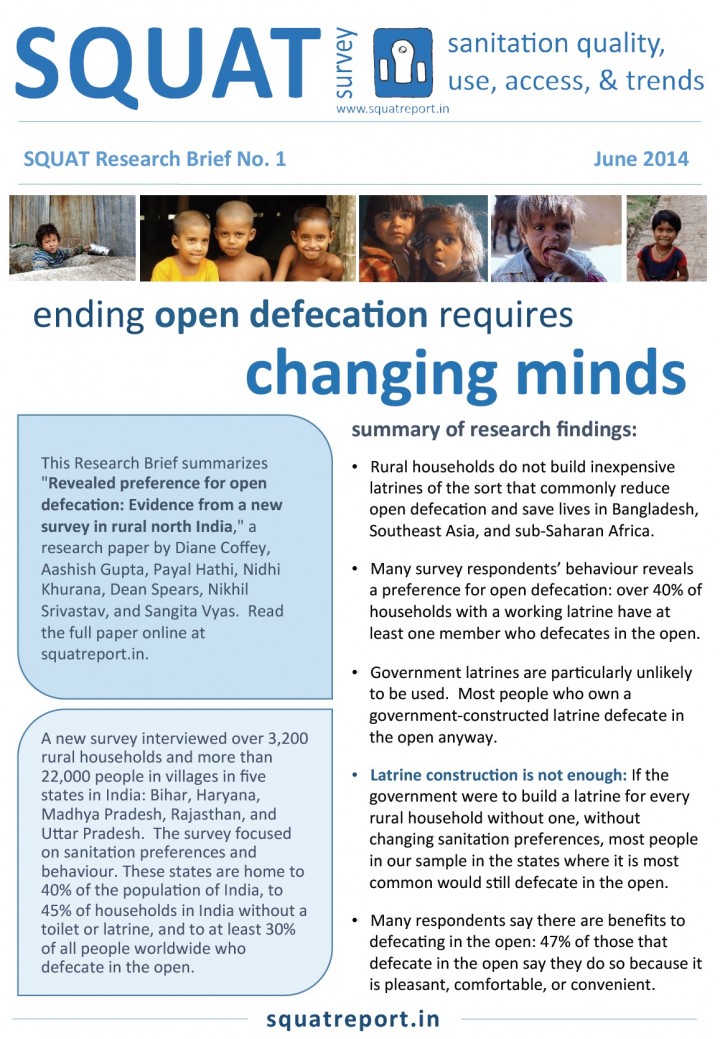SQUAT (Sanitation Quality, Use, Access, and Trends): Evidence based sanitation advocacy for India Various documents on results from research grant Vyas, S. et al. (2014)
This library entry contains background documents for a grant that Sangita Vyas is leading and which is funded by the Bill and Melinda Gates Foundation.
Short description of the project:
Open defecation imposes enormous costs on children’s health and human capital, and is exceptionally widespread in India. We believe that there is convincing evidence of the benefits for health and human capital of safe latrine use. What is needed now is (1) to convince policy-makers of this, and (2) a better understanding of the local political economy, social forces, and economic factors that constrain or promote latrine use.
Ultimately, our goal is to influence Indian policy, such that the government – at its various levels – might better pursue an end to open defecation, especially in rural India, which is r.i.c.e.’s focus. We note that we can only be a small part of this large process. However, many policy-makers still do not recognize sanitation as a top priority; others are missing opportunities to make programs more effective; and nobody fully understands, including we ourselves, how rural communities can be best encouraged to use latrines. Thus, there is a need for basic persuasion of the urgency of safe excreta disposal; for advocacy of more effective policies, based on latrine use, not construction; and for research into the social, institutional, and political mechanisms that might successfully promote latrine use.
See also presentations and posters from UNC Health and Water conference in Oct. 2014:
http://riceinstitute.org/wordpress/2014/10/21/check-out-our-unc-posters-and-presentations/
The following documents are available for download:
1 - SQUAT Research Brief Nr. 1: Ending open defecation requires changing minds, Summary of research findings (2014)
2 - Population density and the effect of sanitation on early-life health (presentation at UNC conference in Oct. 2014) - see further presentations and posters at the link above
3 - Confronting the challenge: Latrine use in rural India (presentation at UNC Water and Health Conference, Oct. 2014)
4 - Presentation at the grantees meeting in Hanoi, Jan. 2015 (Squat Survey overview, poster)
5 - Presentation at the grantees meeting in Hanoi, Jan. 2015 (What explains widespread open defecation in India? Links between widespread open defecation and culture)
Bibliographic information
Vyas, S. et al. (2014). SQUAT (Sanitation Quality, Use, Access, and Trends): Evidence based sanitation advocacy for India Various documents on results from research grant Research Institute for Compassionate Economics (r.i.c.e.), USA
Filter / Tags
Fundamental research and engineeringRuralPoliticians and local decision makersEnglish
External links
Further information on the discussion forum
Presentations and posters at UNC Water and Health Conference in Oct. 2014
SQUAT (Sanitation Quality, Use, Access, and Trends): Evidence based sanitation advocacy for India
Downloads
1 - SQUAT Research Brief Nr. 1: Ending open defecation requires changing minds, Summary of research findings (2014)
Type: application/pdf
Size: 1.81 MB
2 - Population density and the effect of sanitation on early-life health (presentation at UNC conference in Oct. 2014)
Type: application/pdf
Size: 1.02 MB
3 - Confronting the challenge: Latrine use in rural India (presentation at UNC Water and Health Conference, Oct. 2014)
Type: application/pdf
Size: 5.25 MB
4 - Presentation about this project at the FSM3 Conference in Hanoi, Jan. 2015
Type: application/pdf
Size: 19.65 MB
5 - Presentation at the grantees meeting in Hanoi, Jan. 2015 (What explains widespread open defecation in India?)
Type: application/pdf
Size: 6.9 MB

